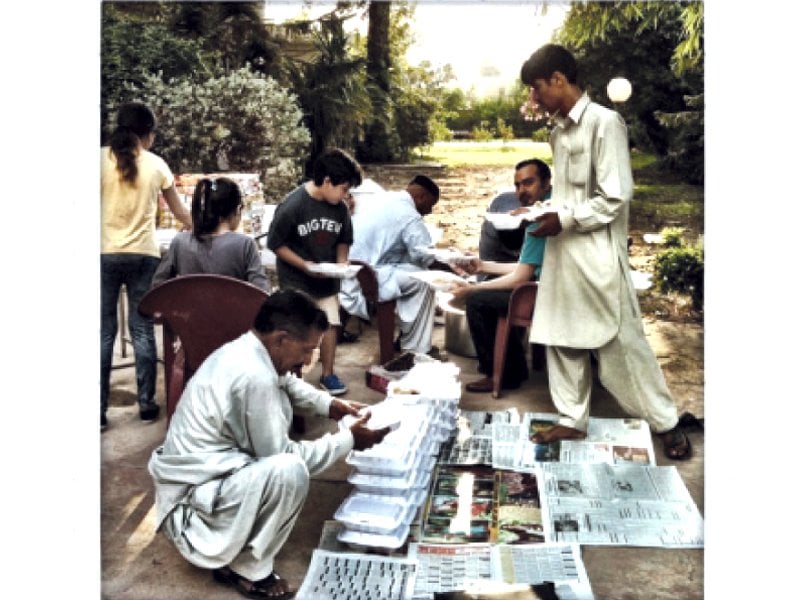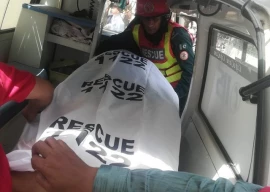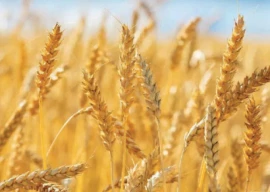
In a country where the sight of unfinished, discarded food on white plates is a common sight at weddings, an organisation based in the twin cities has been trying to create awareness on avoiding food wastage while feeding the undernourished and underprivileged communities.
Thali, a “non-denominational food rescue charity,” is working with the mission of “feeding the less fortunate through meals the more fortunate take for granted”. The idea is to prevent the waste of food and to help the needy by sharing fresh meals or leftovers, Thali Chief Executive Officer Zoone Hasan said.

Hasan said Thali collects good quality, excess fresh food that would otherwise be thrown away by corporate offices, restaurants, caterers and wedding halls and distributes it to impoverished households in a respectable way, often after repacking the food in “meal packs”.
Since registering as a formal organisation in 2009, Thali has completed eight projects related to redistributing food and served around 100,000 beneficiaries in the twin cities, Hasan said.
Thali’s work links directly with the theme of World Environment Day 2013, which falls on June 5. For 2013, the United Nations Environment Programme (UNEP) has chosen “Think. Eat. Save” as the focus of the international day to encourage people to avoid food wastage and food loss.
The United Nations Food and Agriculture Organisation (FAO) estimates that around 1.3 billion tonnes of food is wasted each year, but at the same time, one in every seven people in the world go to bed hungry every day. According to UNEP, food waste is a drain on natural resources because when food is wasted, the resources that went into its production are also effectively lost.
Pakistan is also grappling with challenges of food insecurity and malnutrition.

According to the official National Nutrition Survey conducted in 2011, almost 58 per cent of households nationwide were food insecure, while 31.5 per cent of children under five were underweight. Pakistan had around 35 million undernourished people between 2010 and 2012, according to the FAO’s “The State of Food Insecurity in the World 2012” report.
Despite being one of the top producers of wheat and rice, people in Pakistan often face challenges in access to food, said Abid Suleri, the executive director of the Sustainable Development Policy Institute (SDPI).
According to a 2012 study on food security in Pakistan by Abid Hussain and Jayant Kumar Routray, published in the International Journal of Development Issues, 35 per cent of available food in Pakistan is inaccessible due to various factors and the country’s food gap — the difference between the need for food and ability of the people to receive it — stands at 30 per cent.
Suleri, who also heads SDPI’s food security projects, said affluent Pakistanis should consider that just being able to afford luxuries does not mean they usurp all resources.
“People should realise that the food they are wasting can be used to feed others,” he said. “There should be equitable distribution of food resources.”
Suleri suggested “sustainable consumption” and a balanced diet that includes all food groups at the individual level to prevent food wastage.
Sustainable consumption is a broad term that encompasses resource efficiency, use of renewable energy resources, waste reduction and environmental impact considerations.
In the absence of significant support from big hotels and restaurants, individual action to avoid food wastage has been the main focus of Thali, as well.
Its Urdu slogan of “khaali karo ya thali karo” is a call to action.
“Either eat all the food on your plate, or get the leftovers packed and give it to the first needy person you see,” Hasan said, explaining the slogan.
Among Thali’s other projects, a “Feed a Family” programme helped families displaced by conflict in Pakistan’s northwest and a “Be My Guest” initiative distributed unused food from local restaurants to low-income neighbourhoods. Ramadan drives to distribute meals to the underprivileged, conducted over the past two years, will also be repeated this July, Hasan said.
She said Thali has expanded to Lahore this year and the organisation has also planned campaigns on nutrition and school programmes for the twin cities in 2013.
According to the World Food Programme, hunger kills more people every year than AIDS, tuberculosis and malaria combined, and Hasan thinks that should be food for thought for the wasters.
“Are we still going to waste food rather than going through the embarrassment of getting our leftovers packed? Please say no to wastage of food,” she appealed.
Published in The Express Tribune, June 5th, 2013.










































COMMENTS
Comments are moderated and generally will be posted if they are on-topic and not abusive.
For more information, please see our Comments FAQ